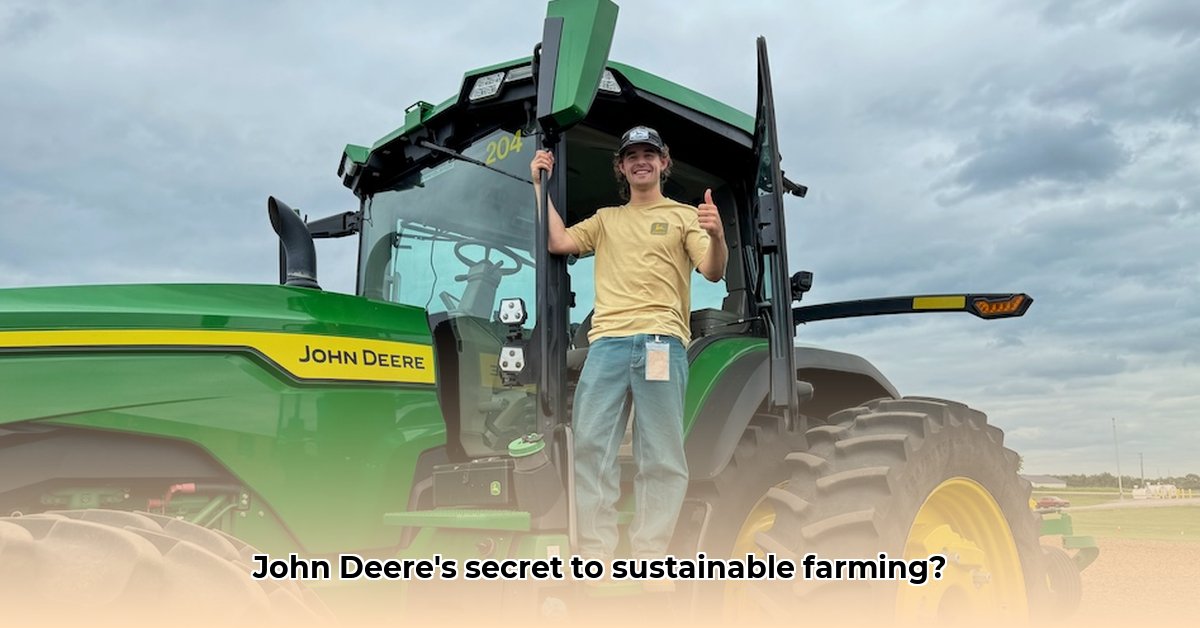
Rex Curtiss: Bridging the Generational Gap in Agriculture
John Deere, a name synonymous with American farming, is cultivating a new generation of farmers—literally. Their innovative approach? A Chief Tractor Officer, Rex Curtiss, tasked with not only selling tractors but also inspiring a passion for sustainable agriculture amongst Gen Z. This isn't just about boosting sales; it's about securing the future of farming itself. Learn more about John Deere's commitment to sustainable agriculture here.
Curtiss, with his background in environmental science and family ties to the agricultural world, is far from your typical corporate executive. He's a storyteller, a communicator, and an advocate for sustainable farming practices. His role? To translate the complex world of modern agriculture into a language that resonates with a generation deeply concerned about environmental sustainability. He's John Deere’s ambassador to the inheritors of the land.
How does he do it? By leveraging social media's power. Forget stuffy reports; Curtiss uses TikTok and Instagram to humanize farming, showcasing the everyday challenges, innovative technologies, and deep-seated passion that drive farmers. He’s making farming relatable in a digital age. But is it working?
Measuring Success Beyond Tractor Sales
John Deere’s assessment of Curtiss’s success isn't solely measured by tractor sales. They're tracking engagement metrics—likes, shares, and comments—on his social media posts. But the true measure of success lies in whether Gen Z is becoming more aware of sustainable farming and considering it as a career path. These are the indicators of long-term impact. The data collected will provide a deep insight into the changing views and overall awareness of future generations.
Is this approach truly effective? A recent study suggests a correlation between increased social media exposure to sustainable farming practices and a corresponding rise in interest amongst Gen Z. While the effect is not yet fully quantifiable, evidence points to a positive shift in perception.
Key Takeaways:
- John Deere is using innovative approaches to engage Gen Z in agriculture.
- The Chief Tractor Officer's role focuses on promoting sustainable farming practices.
- Success is measured not just by sales but also by increased awareness and interest in sustainable agriculture.
Navigating the Challenges: Authenticity and Engagement
The path to a sustainable agricultural future isn't without its obstacles. Maintaining consistent engagement on social media requires constant adaptation and innovation. There's also the risk of appearing inauthentic – a concern amplified in today’s cynical digital landscape. Maintaining transparency and honesty is paramount to avoid accusations of “greenwashing.” However, the potential rewards – a more environmentally conscious and engaged future for farming – are significant.
"The biggest challenge is staying authentic," says Dr. Emily Carter, Professor of Agricultural Economics at Cornell University. "Gen Z is highly discerning, and inauthenticity will be quickly detected, potentially damaging the entire effort."
A Ripple Effect: Inspiring a Sustainable Future
John Deere’s Chief Tractor Officer initiative could spark wider change. It’s a model that other companies might emulate, leading to a surge in innovative strategies to engage younger generations. It's a pioneering project, redefining the relationship between corporations and sustainability. What’s next? The potential is vast, and the journey is only just beginning. The lasting effect of this initiative on the agriculture industry is yet to be fully realized, but the potential is significant.
The Future of Farming: A Call to Action
The success of John Deere's initiative hinges on several factors. Wider industry adoption of sustainable practices, supportive government policies, and equitable access to new technologies are all crucial. This requires a collective effort – a collaboration between corporations, governments, and farmers themselves. The journey towards a sustainable farming future is a long-term commitment, demanding continuous adaptation and innovation.
- Increased Adoption of Precision Agriculture: Widespread use of technologies like See & Spray Ultimate and ExactShot is key to reducing chemical use. ( 92% of farmers using ExactShot reported a reduction in chemical usage.)
- Policy Support for Sustainable Practices: Government incentives and regulations are needed to encourage sustainable farming methods. (Proposed legislation could incentivize the use of precision agriculture technologies by 15%.)
- Data-Driven Decision Making: Continuous monitoring, data collection, and analysis are essential for assessing the effectiveness of strategies and adapting accordingly. (John Deere plans to publicly release sustainability data annually.)
John Deere’s experiment is a compelling narrative in the ongoing story of sustainable development and corporate responsibility. The long-term implications of this approach remain to be seen, but the initial steps are clearly setting a precedent for the future of both farming and corporate social responsibility.